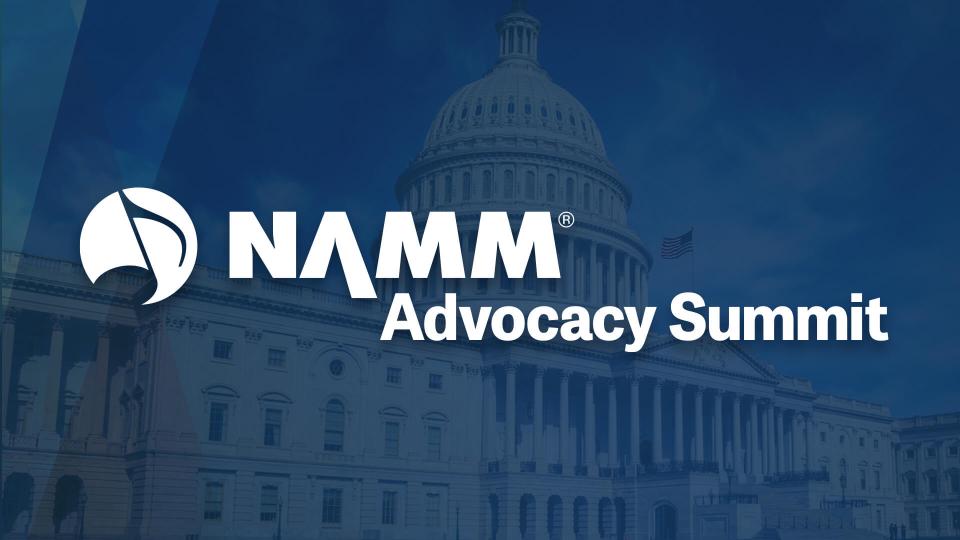
Over 700 Music Education Advocates Join National Movement to Advocate for Music Education for All Children

Yesterday, a delegation of music and arts advocates, music industry leaders, teachers, business leaders, parent, and community supporters joined the NAMM Advocacy Summit to encourage Members of Congress to support existing policy to provide quality, comprehensive school music education programs for all children. The NAMM Advocacy Summit, presented by the National Association of Music Merchants, welcomed over 700 advocates from the U.S. and abroad in support of music education policy and provided a series of briefings from national arts leaders, actionable tools, and peer-to-peer lessons to serve as champions for music education.
Participants in the Summit called on Congress to fully authorize funding for the Every Student Succeeds Act (ESSA) for state and local school districts, including Title I funding for our nation’s most vulnerable children, Title II funding that promotes the effectiveness of our teachers and Title IV, Part A that expands access to well-rounded subjects, including music and the arts. Title VI, Part A funds provide meaningful learning opportunities for all children and fully realize the intent of the federal education law.
The day of advocacy training included presentations from music education leaders, including Chicago CRED managing partner and former U.S. Secretary of Education Arne Duncan. Duncan presented the keynote, “Leading Change: Leadership in Times of Change,” which addressed the leadership attributes and skills needed in schools, businesses, and communities to guide and create equity and access to music and arts education. Duncan shared, “Talent is evenly distributed – opportunity is not… It's about giving everyone a chance to tap into their own genius! Music is the real way to touch somebody's soul."
At the summit, two exclusive research studies were presented: In “The Cost of High-Quality Music Education,” Dr. Mark Fermanich, a Senior Associate with APA Consulting, shared the outcomes of a ten-district research study about the cost of music education programs and how this data can support the case for sustaining and expanding music learning opportunities; and Dr. Susanne Harnett, Managing Senior Associate at Metis Associates, presented “Arts and Chronic Absenteeism: A Four-Year Study of NYC Public Schools” which offered the outcomes and key insights from the nation’s largest public school system.
Other sessions included “Education Forecasts: Changing Demographics and Opportunities for Music Learning,” presented by Chris Duncombe and Claus Von Zastrow from the Education Commission on the States, which provided data-led insight into school enrollment demographics and forecasts and how this information can inform music education opportunities.
In “Advocacy: Give me 5!” a panel of music and arts leaders gathered for fast-paced, five-minute segments about what we need to do as advocates to assure music education opportunities for all students. Participants included Bill Pelto, The College Music Society; Chiho Feindler, Save the Music Foundation; David Dik, Young Audiences Arts for Learning; Eric Whitacre, GRAMMY Award-winning composer, and producer; Habib Bako, Independent Sector; J. Dash, Slapdash Productions; Mackie Spradley, National Association for Music Education; Michael Yaffe, Yale School of Music; Najean Lee, League of American Orchestras; Scott Lang, Be Part of The Music; Stephen Parker, National Governors Association; Tayloe Harding, University of South Carolina School of Music and longtime music education champion and NAMM Foundation Board member Bernie Williams, formerly of the NY Yankees.
A study about Covid mitigation tactics and safer in-person environments was also presented: “Considerations for In-Person Music Education and Performing Arts Activities” reviewed the science behind recommendations for mitigation strategies for music and art classrooms, including aerosol distribution when people sing, play an instrument, perform in theater, debate or read aloud, and the session, “Safer Schools and Campuses” outlined how educators can upload their best practices for in-school music and performing arts using recommended mitigation strategies to the U.S. Department of Education clearinghouse that demonstrate the robust music and arts learning that are part of student learning.
Sessions from the NAMM Advocacy Summit will be available for on-demand viewing until July 31, 2021. Registration is still open to watch videos on-demand. Please visit https://www.eventbrite.com/e/namm-advocacy-summit-tickets-156935463195
Additional information about the National Advocacy Summit and NAMM can be found by visiting https://ww1.namm.org/issues-and-advocacy/2021-advocacy-summit
Media Contacts
NAMM Communications - John Dolak, Director
johnd@namm.org
619.735.4028
The Lippin Group for NAMM
namm@lippingroup.com
201.317.6618
About NAMM
The National Association of Music Merchants (NAMM) is the not-for-profit association with a mission to strengthen the $19.5 billion music products industry. NAMM is comprised of 15,400 global member companies and individual professionals with a global workforce of over 475,000 employees. NAMM events and members fund The NAMM Foundation's efforts to promote the pleasures and benefits of music and advance active participation in music-making across the lifespan. For more information about NAMM, please visit www.namm.org.